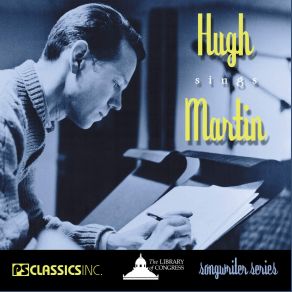Hugh Sings Martin
Download links and information about Hugh Sings Martin by Hugh Martin. This album was released in 2006 and it belongs to Songwriter/Lyricist, Theatre/Soundtrack genres. It contains 19 tracks with total duration of 54:21 minutes.

|
|
|---|---|
| Artist: | Hugh Martin |
| Release date: | 2006 |
| Genre: | Songwriter/Lyricist, Theatre/Soundtrack |
| Tracks: | 19 |
| Duration: | 54:21 |
| Buy it NOW at: | |
| Buy on iTunes $9.99 | |
| Buy on Amazon $16.68 | |
Tracks
[Edit]| No. | Title | Length |
|---|---|---|
| 1. | We the People (From a Hugh Martin Radio Appearance, March 2, 1948) | 0:45 |
| 2. | The Trolley Song (From Meet Me in St. Louis, 1944) | 2:32 |
| 3. | An Apple for the Teacher (From the Film the Star Maker, 1939) | 2:45 |
| 4. | Ooh, What You Said (From Walk With Music, 1940) | 3:09 |
| 5. | Look out (From Too Many Girls, 1939) | 2:37 |
| 6. | Skip to My Lou (From Meet Me in St. Louis, 1944) | 2:55 |
| 7. | The Girl (Boy) Next Door (From Meet Me in St. Louis, 1944) | 2:45 |
| 8. | Just a Little Joint With a Juke Box (From Best Foot Forward, 1941) | 3:41 |
| 9. | What Do You Think I Am? (From Best Foot Forward, 1941) | 2:52 |
| 10. | The Three B's (From Best Foot Forward, 1941) | 5:17 |
| 11. | The Rhythm Is Red an' white an' blue | 2:36 |
| 12. | Gotta Dance (From Look, Ma, I'm Dancin'!, 1948) | 1:58 |
| 13. | Pass That Peace Pipe (From Good News, 1947) | 2:18 |
| 14. | I Happen to Love You (From Hans Brinker or the Silver Skates, 1958) | 3:29 |
| 15. | I Like the Feeling (Intended for the Girl Most Likely, 1957) | 2:13 |
| 16. | The Little Boy (Girl) Blues (From Look, Ma, I'm Dancin'!, 1948) | 3:14 |
| 17. | That's How I Love the Blues (From Best Foot Forward, 1941) | 4:02 |
| 18. | The Story of My Life | 3:29 |
| 19. | Have Yourself a Merry Little Christmas (From Meet Me in St. Louis, 1944) | 1:44 |
Details
[Edit]As might be expected, Broadway and Hollywood songwriter Hugh Martin has not just completed his first solo album as a performer at the age of 91. Rather, Hugh Sings Martin is the seventh collection in a series inaugurated by the Library of Congress to chronicle performances of the work of classic American songwriters by the songwriters themselves, a series that already includes Cole Sings Porter (1994) and Irving Sings Berlin (2001). The albums contain material drawn from demonstration recordings and radio airchecks, among other sources, most of them not originally intended for commercial release. Happily, unlike Cole Porter and Irving Berlin, Martin was still around to assist with the project, and in fact his own archives provide the source for many of the tracks. Those tracks date back to 1940 (circa) with demos by the Martins, the vocal quartet Martin led with his songwriting partner Ralph Blane and the sisters Phyllis Rogers and Jo Jean Rogers, and go all the way up to an April 2005 performance of "Have Yourself a Merry Little Christmas" by a 90-year-old Martin. In between, there are songs written for the movies Meet Me in St. Louis, Good News, and The Girl Most Likely, the stage musicals Best Foot Forward and Look, Ma, I'm Dancin'!, and the TV show Hans Brinker or the Silver Skates. Most of the tracks are previously unreleased, although "The Little Boy (Girl) Blues" appeared on the original Broadway cast album for Look Ma, I'm Dancin'!, and "That's How I Love the Blues" was on the 1957 LP Martin and Blane Sing Martin & Blane. ("I Like the Feeling," meanwhile, is an outtake from the 1995 album Michael Feinstein Sings the Hugh Martin Songbook.) Not all of the songs were written by Martin: "Ooh, What You Said" (by Hoagy Carmichael and Johnny Mercer) and "Look Out" (by Richard Rodgers and Lorenz Hart) are included as examples of Martin's abilities as a vocal arranger. Fans of the songwriting team of Martin and Blane may wonder about the omission of certain songs, among them the well-known "Buckle Down Winsocki," but Martin explains in the liner notes that despite their partnership, the two did not actually collaborate as writers, and Blane wrote "Buckle Down Winsocki" alone, while Martin was solely responsible for such co-credited titles as "The Trolley Song" and "Have Yourself a Merry Little Christmas." Martin is a capable singer, if not nearly as memorable as some of the performers for whom he wrote and whom he occasionally accompanied as pianist, notably Judy Garland. But the album, like the earlier Feinstein collection, serves to focus attention on a highly talented songwriter who has not gotten the recognition he deserves.